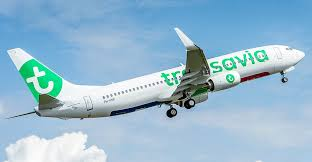#Transavia
Transavia is a low-cost airline that operates primarily out of the Netherlands and France. Founded in 1965, Transavia is a subsidiary of the Air France-KLM Group, which allows it to benefit from the extensive network and resources of its parent company. With its main bases in Amsterdam, Rotterdam, Paris, and Lyon, Transavia offers both scheduled and charter flights to more than 100 destinations across Europe, North Africa, and the Middle East. The airline is particularly popular among leisure travelers seeking affordable flights to holiday destinations.
Table of Contents
#Fleet_and_Routes
Transavia’s fleet is predominantly composed of Boeing 737 aircraft, specifically the 737-800 model, which is known for its reliability and efficiency on short to medium-haul flights. The uniformity of the fleet helps keep operational costs low, a critical factor in maintaining Transavia’s competitive pricing. The airline operates an extensive route network that includes popular holiday spots such as the Canary Islands, the Greek Isles, and the southern coast of Spain, as well as major cities like Lisbon, Barcelona, and Rome. In addition, Transavia offers seasonal flights to destinations in Morocco, Turkey, and Israel, catering to the demands of tourists and expatriates alike.

#Passenger_Experience
While Transavia is a low-cost carrier, it strives to provide a positive passenger experience. The airline offers a variety of fare options, from the basic “Economy” ticket, which includes only the essentials, to the more flexible “Plus” and “Max” fares that come with additional benefits such as extra baggage allowance, seat selection, and priority boarding. Transavia’s on-board service includes the sale of snacks, meals, and beverages, and passengers can pre-order meals tailored to their preferences. Although in-flight entertainment is not provided, the airline’s mobile app allows passengers to download content prior to their flight.

#Sustainability_Initiatives
Transavia has made efforts to reduce its environmental footprint, aligning with broader industry trends towards sustainability. The airline has invested in more fuel-efficient aircraft and implemented measures to optimize flight operations, such as reducing the weight of onboard items and improving flight path efficiency. Transavia also encourages passengers to offset their carbon emissions through partnerships with various environmental organizations. These initiatives reflect the airline’s commitment to operating responsibly in an era where sustainability is increasingly important to both regulators and consumers.

#Competitive_Positioning
In the competitive European low-cost carrier market, Transavia faces stiff competition from giants like Ryanair, easyJet, and Wizz Air. Despite this, Transavia has managed to carve out a niche for itself by focusing on customer service and reliability. Unlike some of its competitors, which have been criticized for their harsh customer service policies, Transavia prides itself on a more customer-friendly approach. This focus has helped it build a loyal customer base, particularly in its home markets of the Netherlands and France. Additionally, its connection with the Air France-KLM Group allows Transavia to offer seamless connections with long-haul flights, a significant advantage over other low-cost carriers.
#Challenges_and_Opportunities
Like many airlines, Transavia faced significant challenges during the COVID-19 pandemic, with travel restrictions and reduced demand leading to a dramatic drop in passenger numbers. However, the airline has gradually recovered, aided by the resurgence of leisure travel as restrictions eased. Moving forward, Transavia faces the ongoing challenge of maintaining profitability in a highly competitive market. The rising cost of fuel, fluctuating demand, and potential regulatory changes related to environmental policies are all factors that could impact its operations. However, the airline also has opportunities to expand its market share, particularly in under-served regions and emerging markets, where demand for low-cost travel is growing.
#Digital_Innovation and_Future_Outlook
Transavia is increasingly focusing on digital innovation to enhance its services and improve operational efficiency. The airline has invested in technology that streamlines the customer experience, from booking to boarding. For instance, Transavia’s mobile app allows passengers to easily manage their bookings, check-in, and receive real-time flight updates. Additionally, the airline is exploring the use of artificial intelligence and data analytics to optimize its pricing strategies and improve customer engagement. Looking forward, Transavia is likely to continue expanding its digital capabilities, potentially integrating more personalized services and exploring partnerships with tech companies to stay ahead in the competitive low-cost carrier market. This focus on digital innovation not only enhances customer satisfaction but also positions Transavia as a forward-thinking airline ready to meet the evolving demands of the aviation industry.
Customer_Loyalty_and_Membership_Programs
Transavia has recognized the importance of customer loyalty in maintaining a competitive edge in the airline industry. Although it operates as a low-cost carrier, it has introduced several initiatives to foster customer loyalty. The airline offers a basic loyalty program where frequent flyers can accumulate points for their travels, which can be redeemed for discounts on future flights or additional services. Additionally, Transavia’s collaboration with other airlines in the Air France-KLM network allows passengers to benefit from a broader range of rewards and services through shared loyalty schemes
indianfastearning.comindianfastearning.com
#Conclusion
Transavia has established itself as a reliable and customer-friendly low-cost airline, serving a wide range of destinations across Europe and beyond. Its strategic focus on holiday destinations, combined with its efforts to maintain a positive passenger experience and commitment to sustainability, has enabled it to remain competitive in a crowded market. While challenges such as rising costs and environmental regulations loom, Transavia is well-positioned to continue its growth, leveraging its strong brand, loyal customer base, and the support of its parent company, the Air France-KLM Group. As the airline industry evolves, Transavia’s ability to adapt and innovate will be crucial in maintaining its position as a leading low-cost carrier in Europe.
www.utube.comwww.utube.com







